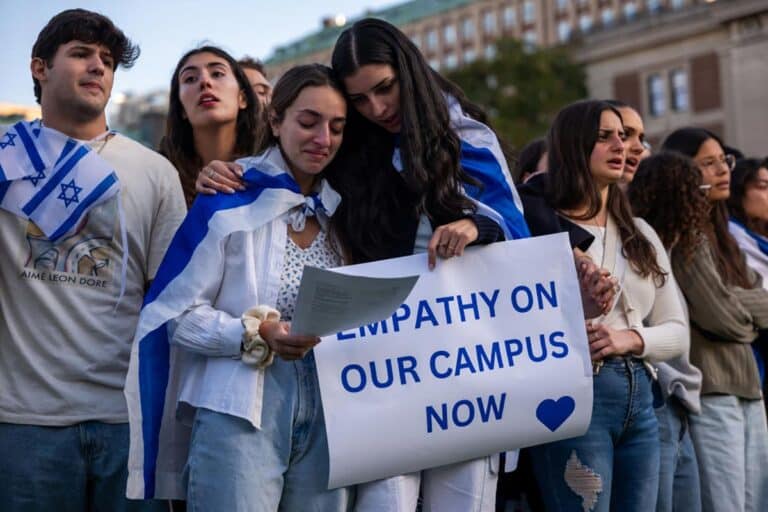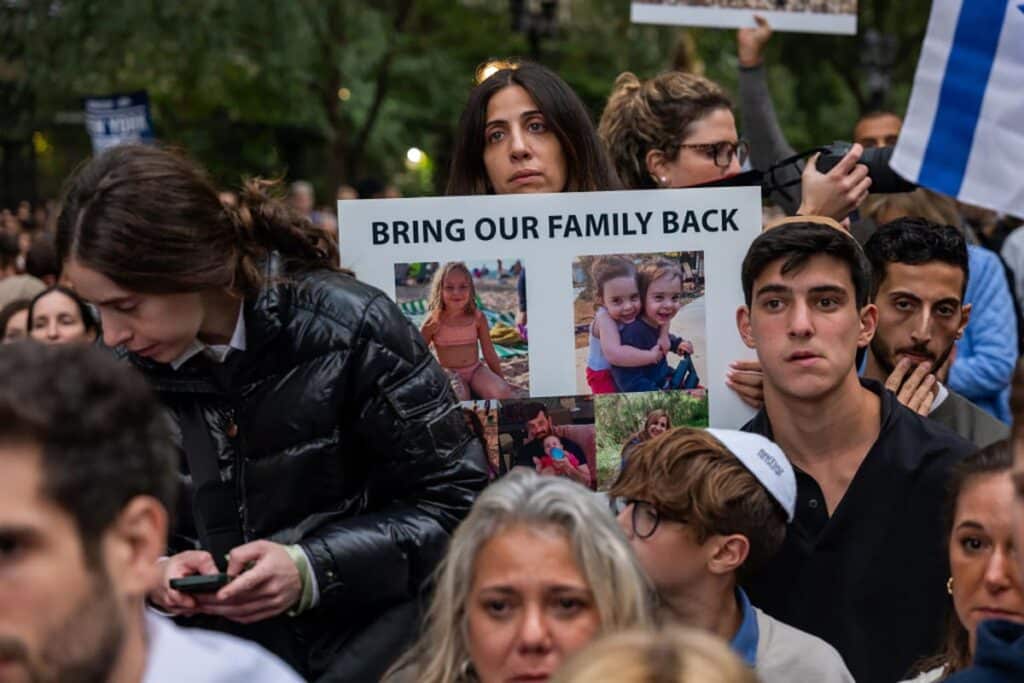
October 7th is now part of Jewish history as the most tragic day we’ve suffered as a people since the Holocaust. Many of us spent the last two weeks alternating between grief, shock, anxiety and anger.
The Jewish community is small. So even if we are not Israeli or haven’t been there, most of us have relatives or friends or acquaintances who have been affected — who lost loved ones, who are related to the hostages, who have been evacuated, who have relatives enlisted.
To lose 1,400 people so cruelly in one day and to be praying for over 220 hostages is beyond heartbreaking.
Read more: Prayers for Israel during this time of war
In the U.S., in addition to the grief, anger and sorrow we feel over the tragedies in Israel, many Jews are also feeling besieged and alone. Many progressive institutions and movements who advocate for other marginalized groups have issued statements blaming Israel for Hamas’s monstrous actions.
We have seen government officials and student leaders decry Israeli retaliation against Hamas with not a word for the Israeli civilians murdered or the ongoing hostage crisis. Many of us believe in peace and pray for the lives of innocent Palestinians in Gaza.
Within our communities, many of us disagree passionately regarding Israeli politics. But all of us understand that Hamas is a terror organization that seeks to murder Jews and that apologists for Hamas are trafficking in the oldest hatred there is: unadulterated antisemitism.
In these challenging and dark times, our tradition offers wisdom for us to lean on and draw strength from.
The Jewish people are like a single organism
First, it is critical to remember that in our tradition, the Jewish people are likened to a single organism. It doesn’t matter where we live, how physically far we are from each other, or how different our politics are — we function much like a single organism.

We know this both because it reflects our own history and ethos and also because the enemies of Jews have never differentiated us based on individual identities or beliefs. During the Inquisition and the Holocaust, Jews were targeted in the same way no matter who they were.
The clear lesson here is that unity is the most potent response we have at this moment. Israeli society has epitomized this message: there has been an overwhelming response to reservist enlistments, with thousands of Israelis returning from abroad to serve. The entire country has mobilized into a civilian front that is beyond inspiring.
Everyone is helping — providing food, clothing, trauma support, supplies for soldiers, babysitting for reservists’ children, and donating blood. In the U.S. and the rest of the world, we must learn from Israeli Jews about the critical need for unity.
We must fight back against compassion fatigue and remind everyone we know in Israel how much we support them and care for them. We must ask ourselves how we can make our voices heard in any way to help out.
It’s vital that we have moral clarity and courage
Second, no matter where we live, it’s vital that we have moral clarity and the courage to insist that terror against civilians is never a legitimate form of resistance. We need the courage to call out the moral rot that has overtaken so many progressive institutions that have become Hamas apologists.
This week we will read about the first Jew, Abraham, who was known as Abraham Ha’Ivri. The rabbis ask why he was called “Ivri.” One answer is that “Ivri” derives from the Hebrew word “ever,” meaning “across.” The whole world stood on one side and Abraham stood me’ever, on the other side.
While the whole world engaged in idolatry and in cruel paganism that demanded submission to absolute rulers, Abraham had the courage to stand alone. He insisted in the one true God who created the heavens and the earth and that what follows from this is human sanctity and dignity. We must make sure that we learn from Abraham and hold on to our moral courage.
We can never give in to despair

Third, we can never give in to despair. These are dark and difficult times and it is easy to doom scroll and to go down a spiral of anxiety. There are too many bad people out there who want to destroy instead of build. But our tradition insists that even in the darkest of times, we must protest evil by holding on to faith and hope.
Rabbi Abraham Isaac Kook (known as Rav Kook) likened each individual to a candle — there can be great darkness in the world, but a single flame can cast a vast light, igniting millions of others in a radiant display of hope and beauty.
My teacher, Rabbi Jonathan Sacks, insisted on the Jewish value of hope — not optimism as a Pollyanish belief that things will be OK, but radical hope that we, collectively, have the power to make things better over time.
Rabbi Sacks once articulated the nuanced difference between optimism and hope this way: “Optimism and hope are not the same. Optimism is the belief that the world is changing for the better; hope is the belief that, together, we can make the world better.”
In these turbulent times, it’s this active, courageous hope that we must cling to. Let us be inspired by the wisdom of our tradition, drawing upon our shared history and values, and together, actively shape a brighter, hopeful future for our community and the world.
Originally Published Oct 23, 2023 04:56PM EDT
